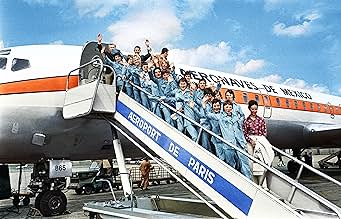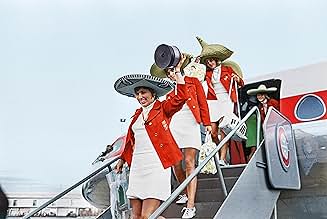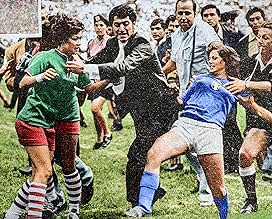Donne pioniere raccontano le loro rivoluzionarie esperienze al Mondiale di calcio femminile 1971, un torneo popolare eclissato dalla storia fino ad ora.Donne pioniere raccontano le loro rivoluzionarie esperienze al Mondiale di calcio femminile 1971, un torneo popolare eclissato dalla storia fino ad ora.Donne pioniere raccontano le loro rivoluzionarie esperienze al Mondiale di calcio femminile 1971, un torneo popolare eclissato dalla storia fino ad ora.
- Regia
- Sceneggiatura
- Star
- Premi
- 1 vittoria e 10 candidature totali
Jaime De Haro
- Self
- (voce)
Stanley Rous
- Self
- (filmato d'archivio)
Recensioni in evidenza
"Copa 71" premiered at TIFF last month, and made its US debut at DocFest as part of the Seattle Independent Film Festival. It received rave reviews at both, so it's telling that as of this writing it's currently rocking a 4.5/10 on IMDb for what is probably the most egregious sin of all-- treating women like human beings.
The film has one primary focus, as shown in the title: In 1971, in Mexico City and Guadalajara, a non-FIFA Women's World Cup was held. Six teams were invited, and where the tournament holders imagined it a sideshow, they had dollar signs in their eyes and stadiums to fill (FIFA denied them the use of the regular stadiums, so they were 'forced' into the two largest stadiums in the country).
As a film, its focus is narrow, but that singular focus is so utterly fascinating, and the players so passionate, that this is hardly a complaint. The burial of this sporting event is mentioned barely at all, the film doesn't even make mention of the next (also overlooked) women's tournament in 1985, skipping to the first official FIFA sanctioned event in 1991.
These are minor concerns, as the film is necessary both as an educational tool, and as a historical document. I'm male, I've got a basic familiarity with soccer, but like all great sports documentaries, you can go in blind and be captivated by the story they're trying to tell, regardless. Yes, the open sexism these women had to deal with is still alive and well (see: the current IMDb rating), but that is less the focus than the very real fact that even in 1971, women playing soccer sold out a 110,000 seat stadium.
You can't not love these women, unless you're the unfortunate type of person who never cared for women in the first place. If that's you, you don't need to review bomb, just find something else to be mad about. Women's soccer is the fastest growing sport in the world, and this documentary is a testament that it's been a long time coming.
The film has one primary focus, as shown in the title: In 1971, in Mexico City and Guadalajara, a non-FIFA Women's World Cup was held. Six teams were invited, and where the tournament holders imagined it a sideshow, they had dollar signs in their eyes and stadiums to fill (FIFA denied them the use of the regular stadiums, so they were 'forced' into the two largest stadiums in the country).
As a film, its focus is narrow, but that singular focus is so utterly fascinating, and the players so passionate, that this is hardly a complaint. The burial of this sporting event is mentioned barely at all, the film doesn't even make mention of the next (also overlooked) women's tournament in 1985, skipping to the first official FIFA sanctioned event in 1991.
These are minor concerns, as the film is necessary both as an educational tool, and as a historical document. I'm male, I've got a basic familiarity with soccer, but like all great sports documentaries, you can go in blind and be captivated by the story they're trying to tell, regardless. Yes, the open sexism these women had to deal with is still alive and well (see: the current IMDb rating), but that is less the focus than the very real fact that even in 1971, women playing soccer sold out a 110,000 seat stadium.
You can't not love these women, unless you're the unfortunate type of person who never cared for women in the first place. If that's you, you don't need to review bomb, just find something else to be mad about. Women's soccer is the fastest growing sport in the world, and this documentary is a testament that it's been a long time coming.
It's quite interesting that even now, there are those amongst the footballing establishment who dismiss this competition as little better than an unsanctioned exhibition event of no consequence whatsoever. If you watch it, however, you can't help but get a sense of the pride with which the women from six teams assembled in Mexico to play. James Erskine et al has done a quite an effective job tracking down many of the players who took part and at finding some grainy, but perfectly watchable, archive of the games and of the celebratory nature of the hosting country back in 1971. The narrative and commentaries take a pretty firm swipe at the men-only culture that prevailed in the sport - and amongst most of their advising medical professionals - which limited women's participation in the sport and though the film make precisely no attempt to balance it's clear objective with any counter-arguments about the perceived dangers to women players, or feature any interviews with anyone from FIFA or UEFA regarding their decision making rationale, this still makes for quite a powerful depiction of just how inclusive football, as a sport, can be. The contributors are engaging and as one Dane points out - she can knit and she can use a chainsaw, so why not play football?
The 1971 Women's World Cup in Mexico pulled on crowds of 100,000 passionate football fans. Who knew? Well I didn't and that's the point of this documentary, no one does. With an intro from Serena Williams and with many contributors playing in the tournament itself, it's a fascinating account and let's make this clear from the start, it's brilliant. Not just the way it's been put together, which is flawless, but much of the archive footage of the matches is stunning and the football is fabulous. It's a story of repression. Girls and women told that football is not for them and them replying yes it bloody is!! Well, sort of. It's not a tale of out and out rebellion, more a slow burn that started over 100 years ago with girls playing in secret and I guess takes us to present day with players in the WSL becoming household names. The focus here though is Copa 71, the first women's World Cup (still not acknowledged by FIFA) and the players who took that first step. Whether in England, Italy, France, Denmark, Argentina and of course Mexico, the message is the same, let us play. Theres plenty of history, but it goes back much further than the 70s. For instance did you know that in 1917, there were around 100 women's teams in England? How much further we could be if it weren't for doctors... and those are men of course, because women weren't welcome in that world either, saying that football was too dangerous for women and their ovaries. So the FA ban women's football in 1921. Proving that the FA have always been a bunch of idiots. This spreads around the world, but come the 60s enough is enough. It's never gone away, simply forced into the shadows, but here, to a Nancy Sinatra score, woman's football breaks through once more. But why haven't we heard of Copa 71? Well The FA aren't the only idiots of this story and it'll be no surprise to find that FIFA too have their heads stuck up their arses. Nothing's changed there. Not all men are idiots in this story, there are some money grabbing ones too. Off the back of the success of the men's World Cup, Mexico 70. The organisers have a taste for money and think, why not do this again... with women. However, because there's no infrastructure, the football governing bodies around the world refuse to recognise Copa 71 as a World Cup and ignore it. This entire film is bomb blowing apart all that patriarchal oppression, but what's brilliant about it, is the way it puts the players front and centre. They are revolutionaries, they lit the fuse. It's beautiful listening to them talk, reminisce, get choked up as they recall walking into massive stadiums that dwarf many modern structures and are cheered like the heroes they are, but there's ups and downs, winners and losers... it's football. You know what I'm going to say though don't you... there are no real losers here. There is controversy though, again it's football, but the tournament is a hit, both in a sporting nature and commercial clout. It's not just a story about football though. These women were thrust into a volatile situation where the stakes were insanely high, this deftly twists way around each thread of its fascinating narrative. And this is all before we get to the final with a record breaking 110,000 people packed into Mexico City's Azteca Stadium. This had me on the edge of my seat, smiling, utterly gripped. Sadly it's taken far too long for women's football to get the recognition it deserves, but we're finally learning and this film is a valuable lesson. Support women's football and push back against oppressive idiotic male dominated governing bodies who are too stubborn to share the ball. The people on screen here for 90 minutes are an inspiration to us all. A massive thank you to everyone involved in this documentary.
This film brought me so much joy but also left me with a sad rage. To think of where women's football could be now if it wasn't for frail male egos. It's such a well made film and all ex players involved tell the story so well, you can see how emotional they still are and what it meant to be a part of this wonderful tournament that was hidden from history. The match footage is so well restored and it felt amazing to see it on the big screen. I just wish we hadn't been denied so many years of great tournaments and a history of great players. It ended on a positive though, as someone who regularly attends matches and follows the WSL and the Lionesses passionately I feel very confident that the sport will continue to grow. It's a testament to those wonderful players in 71.
This is a great documentary and a must-watch for everyone. I knew about Copa 71 before I watched the movie, but I din't know much of the details. I was crying my eyes out, out of anger and frustration.
At one point, when they interview some of the Argentinian women and they mention how little support they got from their federation, I imediately thought about last weeks news that the now active Argentinian womens team only got a banan and a sandwich for lunch at their last assembly. While progress in womens football has exploded in the last few years it is vital that we all help making sure that every country support the womens team as much as the mens team.
Anyway. Watch this movie and weep. Then rise up and organize.
At one point, when they interview some of the Argentinian women and they mention how little support they got from their federation, I imediately thought about last weeks news that the now active Argentinian womens team only got a banan and a sandwich for lunch at their last assembly. While progress in womens football has exploded in the last few years it is vital that we all help making sure that every country support the womens team as much as the mens team.
Anyway. Watch this movie and weep. Then rise up and organize.
Lo sapevi?
- QuizCarol Wilson, who played was the England captain in the tournament, was only 19 years old at the time. Three of her teammates, Leah Caleb (age 13), Gill Sayell (14) and Chris Lockwood (15) were still schoolgirls when they played in the tournament.
I più visti
Accedi per valutare e creare un elenco di titoli salvati per ottenere consigli personalizzati
- How long is Copa 71?Powered by Alexa
Dettagli
- Data di uscita
- Paese di origine
- Siti ufficiali
- Lingue
- Celebre anche come
- Copa '71 - succén som tystades ner
- Aziende produttrici
- Vedi altri crediti dell’azienda su IMDbPro
Botteghino
- Lordo in tutto il mondo
- 197.067 USD
- Tempo di esecuzione1 ora 30 minuti
- Colore
- Proporzioni
- 2.00 : 1
Contribuisci a questa pagina
Suggerisci una modifica o aggiungi i contenuti mancanti

























